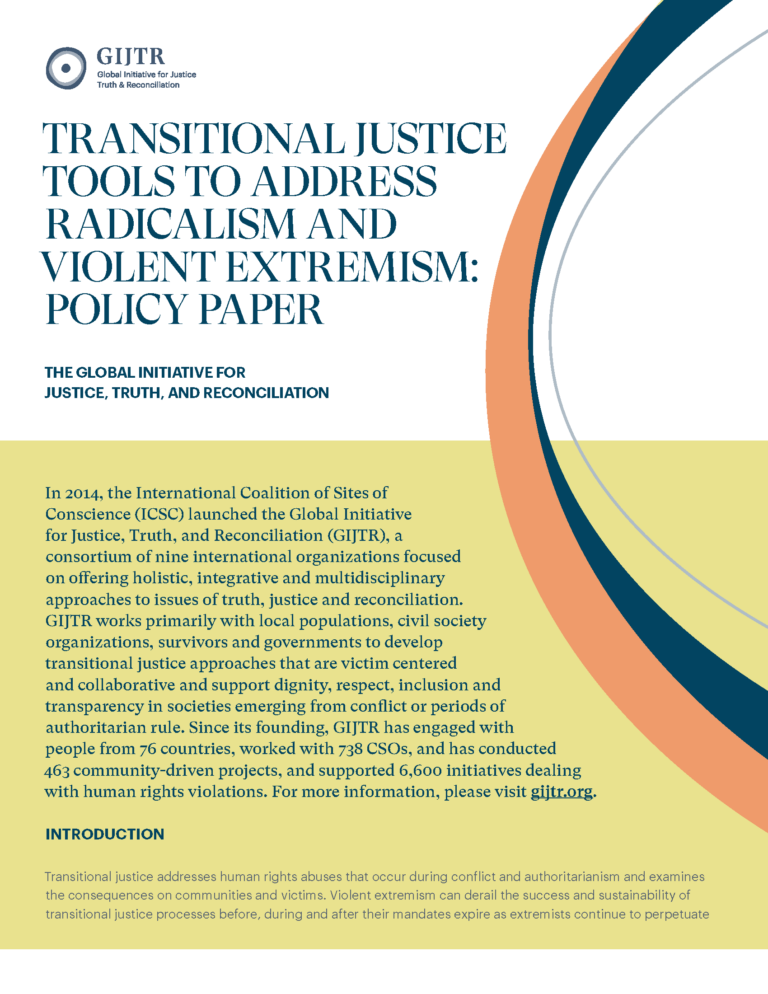Transitional Justice Tools to Address Violent Extremism and Radicalism
In practice, transitional justice seeks to address human rights abuses that occur during conflict and authoritarianism and examine the consequences on communities and victims. Violent extremism can derail the success and sustainability of transitional justice processes before, during and after their mandates expire, as extremists continue to perpetuate violence. To address this, GIJTR partners conducted a project that examines how transitional justice tools can be harnessed to address aspects of the threat of violent extremism across three regions – the Sahel region in Africa, the Balkan region in Europe, and Sri Lanka in Asia.

Context
The threat of violent extremism is on the rise globally. From far-right-wing groups gaining legitimate political representation in Eastern Europe to armed attacks by militia groups in the Sahel region of Africa, to the continued threat of terrorism following the Easter bombing attacks in Sri Lanka in 2019, each of these pose unique challenges and opportunities in the transitional justice space. In practice, transitional justice seeks to address human rights abuses that occur during conflict and authoritarianism and examine the consequences on communities and victims. Violent extremism can derail the success and sustainability of transitional justice processes before, during, and after their mandates expire, as extremists continue to perpetuate violence. These groups are often excluded from transitional justice mechanisms; when they are included in accountability mechanisms, such as national criminal justice systems, it is usually in ways that fail to recognize the gravity of their crimes. The threat of terrorism and related offenses are often met with militarized responses that attempt to contain and combat their reach and influence, as opposed to community-level approaches. While securitized responses are necessary to combat the threat of extremism, such a response on its own is not effective. As has been observed in conflict settings, there are some people associated with these groups that are driven to do so by economic, survival-driven needs and not ideological association, such as forcibly married women, kidnapped children, drivers, doctors, or communities that are unwillingly under a group’s territorial control. This nuance is where transitional justice mechanisms can offer multi-layered approaches to justice and accountability for communities and states. Furthermore, the community-level approaches to guarantees of non-recurrence and truth-telling can provide further insight into the root causes that violent extremist groups use to form and recruit in the first place and disrupt and discredit harmful narratives used by extremist groups.
Project Details
In 2023, GIJTR partners developed “Transitional Justice Tools to Address Violent Extremism and Radicalism,” a project that explores how transitional justice tools can be harnessed to address aspects of the threat of violent extremism across three regions – Africa (specifically Burkina Faso, Mali and, Niger), the Balkan region, and Asia (specifically Sri Lanka). In particular, GIJTR partners engaged in participatory research within selected affected communities and explored the utility of non-securitized, transitional justice-based tools to address radicalization and violent extremism, such as the following: community dialogues as truth-telling and reconciliation processes; justice and accountability processes, including alternative justice mechanisms, in the context of mass criminality; trauma-informed responses to communities affected by violent extremism; institutional reform within state structures to bridge the gaps created by mistrust between security forces and communities; and reparations, including community-based memorialization, for communities affected by violent extremism.
The connections between different forms of radicalization and extremism and transitional justice have been analyzed through case studies examining specific contexts and a policy paper highlighting risk factors and proposing policy recommendations.
Goals and Objectives
Identify the root causes that lead to the emergence and sustenance of radicalization and violent extremism in the regions of focus, as they relate to transitional justice tools and processes;
Project partner, CSVR produced a compendium of relevant literature to identify research gaps, as well as to map out radicalization, violent extremism and terrorism in its various forms and manifestations with a specific focus on linking transitional justice tools addressing these threats. This literature reviews and identifies the types of radicalization, terrorism and violent extremism that exist in the three regions of the study and draws on global and regional policy frameworks, such as the United Nations Global Counterterrorism Strategy, in particular, its Pillar 4; the ECOWAS Counterterrorism strategy; and Plans of Action to Address Violent Extremism, among others.
Explore existing best practices in communities and civil society within the range of transitional justice tools that lend support to alternative responses to a securitized approach to addressing radicalism and violent extremism and which involve communities affected by this threat; and
Key partner civil society organizations in the three proposed regions, over the course of three months, implemented local projects to use transitional justice-based tools in addressing concerns around the threat of radicalization and violent extremism in their communities. Consortium partners provided mentorship to participating CSOs during the planning and implementation of their activities.
Raise awareness of existing and new tools drawn from transitional justice processes that can address the threat of radicalization and violent extremism.
To share the findings of the project, partners will host a public webinar to launch a policy paper and explore key ideas that emerged on this topic over the last year. In particular, this session will share utilized transitional justice-based tools to address radicalization and violent extremism, such as the following: community dialogues as truth-telling and reconciliation processes; justice and accountability processes, including alternative justice mechanisms, in the context of mass criminality; trauma-informed responses to communities affected by violent extremism; institutional reform within state structures to bridge the gaps created by mistrust between security forces and communities; and reparations, including community-based memorialization, for communities affected by violent extremism.

Case Studies
These case studies will examine the connections between different forms of radicalization and extremism and transitional justice in the three regions – Africa (specifically Burkina Faso, Mali and Niger), the Balkan region, and Asia (specifically Sri Lanka). Please, see a list of all case studies below.

Policy Brief
This policy brief highlights some of the risk factors for different forms of radicalization and extremism. Considering key findings of the different case studies, the document includes a series of policy recommendations that can be utilized in transitional justice processes.
Bosnia
This piece is available in English and Bosnian.
Burkina Faso
This piece is available in English and French.
Mali
This piece is available in English and French.
Niger
This piece is available in English and French.
Serbia
This piece is available in English and Serbian.
Sri Lanka
This piece is available in English

Webinar
On January 28, 2024, GIJTR partners hosted a webinar to share the findings of their recent project on how transitional justice tools could be harnessed to address aspects of the threat of violent extremism.
This event included the launch of the project’s policy paper and explored key findings by local GIJTR partners working on this topic over the last year. In particular, this session shared utilized transitional justice-based tools to address radicalization and violent extremism, such as the following: community dialogues as truth-telling and reconciliation processes; justice and accountability processes, including alternative justice mechanisms, in the context of mass criminality; trauma-informed responses to communities affected by violent extremism; institutional reform within state structures to bridge the gaps created by mistrust between security forces and communities; and reparations, including community-based memorialization, for communities affected by violent extremism.
